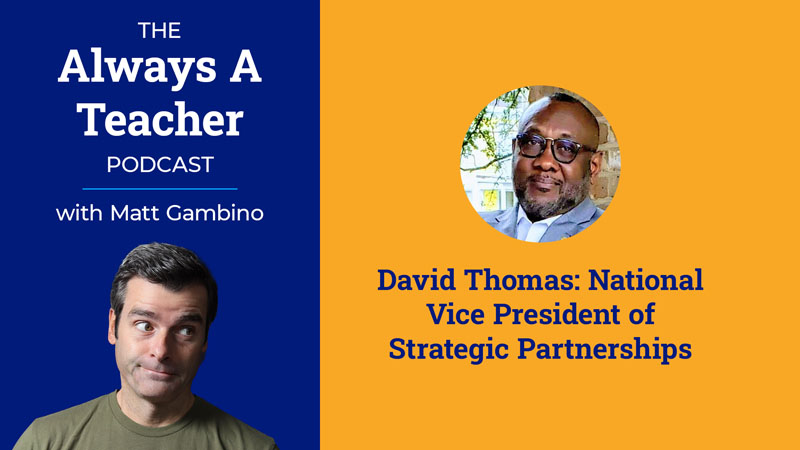
Show Notes
David Thomas's entire career has been guided by a single mission: using technology to close the learning and achievement gaps for all students. A former community college history professor and administrator, David's journey into edtech began in the earliest days of "distance learning"—long before the internet. Today, he's the National Vice President for Strategic Accounts at Rethink Ed, a company dedicated to supporting the "whole child" through mental health, behavior, and social-emotional learning solutions. In this episode, David shares his powerful "why," his unique path from higher education to K-12 policy, and his advice for educators who want to find a corporate role that aligns with their personal mission.
- "If You Don't Feed the Teachers...": David explains Rethink Ed's core philosophy: you can't help students with their mental and emotional health until you've provided professional development and support for the *teachers* first.
- Post-Pandemic Behavior: David discusses the new behavioral challenges schools are facing, especially from younger students who missed the socialization of kindergarten and are being taught by a new generation of non-certified teachers.
- A Winding Path: David details his non-linear career, from a history professor specializing in African-American history to working on the policy team for "No Child Left Behind" and running credit-recovery programs.
- A "Partner," Not a Salesperson: As a VP of Strategic Accounts, David explains how his role is about being a "thought partner" with districts to solve their pain points, not just selling a product.
- Advice: Align With Your Mission: David's top advice for teachers is to find a company whose mission you truly believe in. He explains why he only works for organizations he feels enhance outcomes for *all* kids, especially the "historically underserved."
Episode Article
For David Thomas, National Vice President for Strategic Accounts at Rethink Ed, his work is personal. His company focuses on the "whole child," providing curriculum, training, and support for social-emotional learning, mental health, and behavior—needs that have become more critical than ever post-pandemic. "Teachers are witnessing a lot of behaviors that they had not seen prior to COVID," David explains, noting that many younger students "missed a lot of those socialization skills" from kindergarten. This problem, he says, is compounded by the number of new, non-certified teachers who have no training in behavior management.
Rethink Ed's approach to this crisis is what sets them apart. "If you don't feed the teachers," David says, "they can't feed the kids." Their model is built on providing robust professional development to educators *first*, giving them the tools and support to handle their own social-emotional needs so they can, in turn, be effective for their students. It's this partnership approach, rather than a hard-sell "door-to-door" tactic, that has made David's work so successful, helping him build "thought partner" relationships with eight of the ten largest districts in the country.
David's journey to this role wasn't a straight line. He began his career as a history professor at Bishop State Community College, specializing in American and African-American history. His first taste of edtech came in the early days of "distance learning," where he connected campuses with video cameras long before online courses were common. From there, his passion for policy led him to work with the technical team of "No Child Left Behind" and later to an edtech company focused on credit recovery for students who had been expelled or pushed out of the system.
Through all these roles, David's "why" has remained the same: a deep-seated belief that technology is the key to closing the achievement gap. "Technology, in my opinion, eliminated a lot of those barriers," he shares, "and was the tool that brought access and opportunity for all kids." It's this mission that guides his advice for teachers. He urges anyone considering a transition to do their research and find a company they truly believe in. "I've always looked at... how will that service and solution best benefit kids," he says, "particularly those kids who have been historically underserved."
